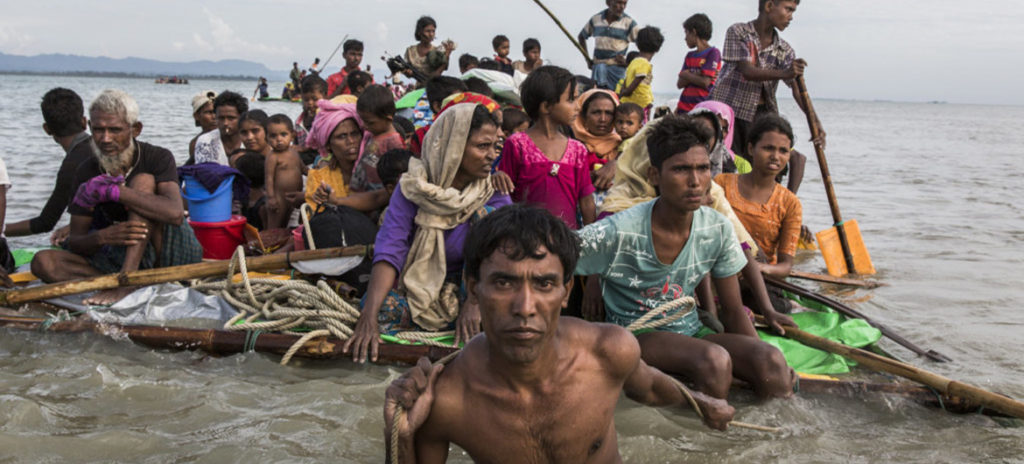Three years after exodus, Rohingya refugees ‘more vulnerable than ever’
Three years into the Rohingya refugee crisis, women, men and children – driven from their homes in Myanmar into camps across the border in Bangladesh – are more vulnerable than ever, UN agencies have reported.

According to the UN World Food Programme (WFP), almost all refugees remain entirely dependent on food assistance to survive.
“The availability of foods in camps, outside of WFP assistance, has been shrinking and prices rising,” Elisabeth Byrs, a spokesperson for the UN agency, told a media briefing on Tuesday.
Disrupted supply chains due to COVID-19lockdown measures are also affecting availability of fresh food, she added.
The pandemic has also hit the scaling up of WFP’s e-voucher programme, which provides food assistance to almost 88 per cent of the refugees. Efforts to cover all camp residents, originally planned to be completed in the first half of 2020, have been pushed towards the end of the year, owing to the outbreak.
Measures have been taken to mitigate the risk of COVID-19 at in-kind distribution sites where about 12 per cent of refugees receive rice, lentils and oil, added the WFP spokesperson.
She urged the international community to continue supporting response efforts, or else risk the situation deteriorate rapidly.
“The international community must not turn its back on the Rohingya,” said Ms. Byrs.
COVID-19 outbreak could be ‘devastating’
There are fears that an uncontained outbreak of COVID-19 in the refugee camps, such as the main camp in Cox’s Bazar in southern Bangladesh – the largest and most overcrowded in the world – could be devastating.
With several hundred thousand people living in an area of just 13 square kilometres, social distancing is almost impossible.
In addition to COVID, relentless rain and hazardous weather have added to the challenges. According to humanitarian reports, over 100,000 refugees have been affected due to the heavy monsoon rains, this year, that destroyed shelters and washed away crops.
Disrupted learning
Lives of Rohingya refugee children have also been severely hit by the pandemic. Education centres in the camps have been closed since March, as is the case in the rest of Bangladesh, keeping more than 300,000 children and adolescents away from learning opportunities, according to UN Children’s Fund (UNICEF).
“Rohingya refugee children need opportunities to develop knowledge and skills for their future. That in turn will enable them to contribute to peace and stability,” said Jean Gough, UNICEF Regional Director for South Asia.
UNICEF and partners are assisting efforts to help children learn at home, engaging parents and caregivers to support learning and providing workbooks and visual aids. However, significant challenges remain, including the fact that many parents cannot read and write.
‘Extraordinary resilience’
In spite of the incredibly difficult circumstances, the refugee population is actively participating in response efforts to prevent and manage the threat of COVID-19.
Despite unimaginably difficult circumstances … these families continue to teach us each day what strength, courage and perseverance are – Jean Gough, UNICEF
With the reduction of humanitarian workers in the camps to limit the spread of coronavirus, humanitarian organizations and UN agencies have established new ways to deliver critical services and raise awareness on the disease, said UNICEF.
Rohingya volunteers and Bangladeshi personnel have been essential to such efforts.
In July, for instance, UNICEF and partners launched a door-to-door Vitamin A supplementation campaign. Rohingya volunteers proved vital in reaching 154,000 children aged 6 months to 5 years.
The campaign covered 97 per cent of the target children, “a remarkable outcome” considering the challenging situation and the heavy monsoon rainfall, added UNICEF.
“Rohingya refugee children and families have shown extraordinary resilience while living in exile in Bangladesh. Despite unimaginably difficult circumstances … these families continue to teach us each day what strength, courage and perseverance are,” said the UNICEF Regional Director.
A complex refugee crisis
The complex Rohingya refugee crisis erupted in August 2017, following attacks on remote police outposts in northern Myanmar by armed groups alleged to belong to the community. These were followed by systematic counter attacks against the minority, mainly Muslim, Rohingya, which human rights groups, including senior UN officials, have said amounted to ethnic cleansing.
In the weeks that followed, over 700,000 Rohingya – the majority of them children, women and the elderly – fled their homes for safety in Bangladesh, with little more than the clothes on their backs.
Prior to the mass exodus, well over 200,000 Rohingya refugees were sheltering in Bangladesh as a result of earlier displacements from Myanmar.
